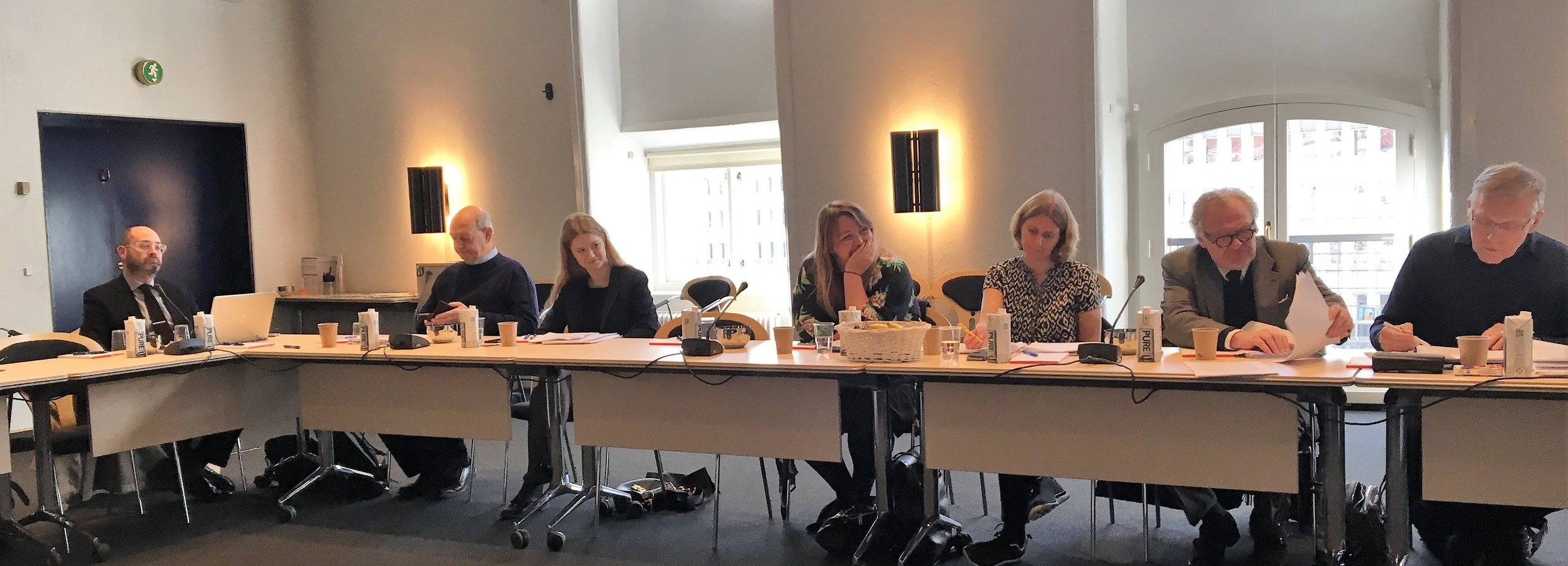EIN attends NGO consultation in Copenhagen
/On 6 February 2018, the European Implementation Network (EIN) was invited by the Council of Europe Chairmanship of Denmark to participate in a civil society consultation in Copenhagen.
The purpose of the event was to seek feedback from NGOs and other civil society organisations on the draft political declaration on the European Convention on Human Rights. Building on the so-called “Interlaken Process” involving the respective Convention conferences held between 2010 and 2015 in Interlaken, Izmir, Brighton and Brussels, the final declaration will be adopted by the member states of the Council of Europe at a meeting of ministers in mid-April in Copenhagen.
The Danish Chairmanship team.
Photo: EIN
The consultation took the form of a roundtable discussion with over 20 representatives from international, European and Danish NGOs and civil society organisations, including the Legal Resources Centre from Moldova which is an EIN member. The event was chaired by Rasmus Kieffer-Kristensen, Head of the Initiative on the European Court of Human Rights (ECtHR) at the Danish Ministry of Justice; along with Jonas Christoffersen, Director of the Danish Institute of Human Rights.
The chairs noted during the introduction the main goals of the Chairmanship regarding the next declaration, namely to reaffirm member state commitments to the Convention system. At the same time, the Chairmanship intended to address what it assessed as the main challenges affecting the Convention system including those related to the efficiency of the ECtHR, such as the current caseload and the full implementation of judgments. Denmark also hoped to propose new ideas for the future, such as instituting debates on serious instances of non-execution of ECtHR judgments at the annual ministers’ meetings.
NGO representatives at the consultation. Photo: EIN
The EIN Director, Kevin Steeves, and other NGOs representatives thanked the Danish Chairmanship for organising the roundtable. In terms of initial feedback on the draft declaration, text dealing with the themes of national implementation and the execution of judgments, for example, was largely welcomed. In turn, EIN and other NGOs noted concerns with some core elements of the draft declaration. These included the Chairmanship’s interpretation of the principle of subsidiarity regarding the primary role of national systems in safeguarding human rights; and the associated margin of appreciation that national courts are afforded in implementing the Convention and when. NGO representatives cautioned against any language that could be interpreted as challenging the role and authority of the ECtHR, including around asylum and immigration and in the context of dealing with cases stemming from conflicts. Similar questions were asked of language in the draft declaration suggesting the need for “enhanced dialogue” between member states and the ECtHR including the engagement of “States Parties and their populations” in debates on Convention rights.
After the consultation, EIN teamed up with five other NGOs to adopt a joint statement on the draft declaration. This was the second joint effort by the NGOs, following the first NGO response to the Danish initiative stemming from the High-Level Expert Conference called ‘2019 and Beyond: Taking Stock and Moving Forward from the Interlaken Process’, which was held in Denmark at the end of November 2017. In the second declaration several specific recommendations for amendments to the draft declaration were made. In total, EIN and the other NGOs argued that the amendments were necessary in order for the final declaration to clearly state the Court’s independence and more broadly the universality of human rights.
In addition to the member state replies on the Danish draft declaration, there have also been responses from the ECtHR itself as well as other important stakeholders such as the Conference of International NGOs of the Council of Europe.
In the case of the ECtHR, it prepared an opinion on the draft declaration. In particular, the Court noted that:
“[i]t has been the consistent message of the Court throughout the reform process that the implementation phase of the procedure is in need of improvement. … The Court therefore considers that the critical importance of effective execution for the overall functioning of the Convention system calls for special emphasis in the declaration. It invites the Conference to explicitly reiterate the States Parties’ strong commitment to the full, effective and prompt execution of judgments of the Court, …”
EIN will continue to analyse developments and meet with relevant stakeholders in order to monitor the process leading up to the adoption of the final declaration in Copenhagen in mid-April.








